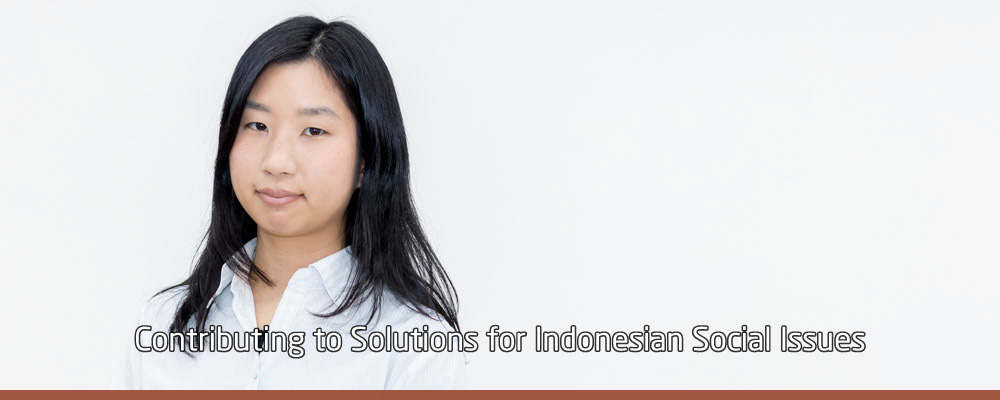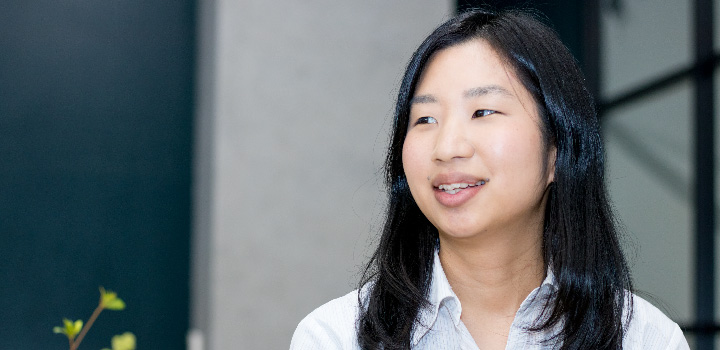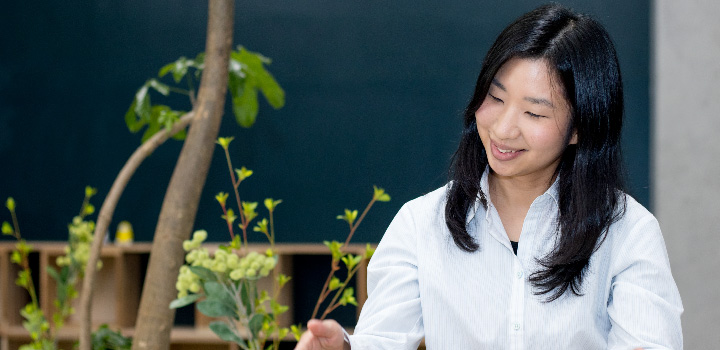Global Site
Breadcrumb navigation
Message for students 2018: Asuka Matsuba
May 30, 2018
Asuka Matsuba

Asuka Matsuba
(Ms. Matsuba has transferred to Business Design Center, Corporate Business Incubation Division as of April 2018.)
Joined NEC in 2013. Stayed in Indonesia for three months starting in August 2016 as part of an international volunteering program to focus on the growing social problem of waste treatment. After returning to Japan, Matsuba has been promoting the creation of social solutions in the digital healthcare field.
Participated in the international volunteering program after an inspirational discussion with a senior colleague
My college major was inorganic chemistry. Since joining NEC, I have continued to research a wide range of topics including thermoelectric converters based on the spin Seebeck effect, phase change cooling, and future work style where AI and humans can coexist together. I am now researching solutions in the digital healthcare field at the Value Co-creation Center.
The fourth year was a significant turning point in my career. I was shocked by a discussion that I had with Mr. Nobuyuki Yasukawa, a senior colleague in the same laboratory at the time. Mr. Yasukawa applied for the international volunteering program and was selected to go to India and build a supply chain in a rural area. When I heard about that experience, I felt that my worldview was extremely narrow. I was worried about whether I could make a contribution, but I was deeply impressed by the idea of seeing the problems that are occurring in developing countries with my own eyes, selecting an issue, and cooperating with various people to resolve social problems. I felt strongly that it was a challenge that I would like to take on.
- *A program where employees work for several months at NPOs and social enterprises in developing countries to use their skills to solve social problems together with those organizations.
NEC has also introduced this program at the Central Research Laboratories as a part of human resources development
Ref: https://crossfields.jp/service/transfer_program/
https://crossfields.jp/service/transfer_program/
Devoting all of my energies to the social problem in front of her for three months

I chose Indonesia as the location for my international volunteering stint. Trash is now becoming a social problem in Indonesia. Most of the trash that is disposed by companies and households is not separated. Large quantities of garbage are combined and piled up in landfill sites, and mountains of garbage are scattered across various locations in the country. I grappled with this problem by working for three months at a company called Waste4Change that is promoting trash separation and composting, and making people responsible for their own waste.
The top mission required by Waste4Change was a way to improve the efficiency of the composting process. Accordingly, the first half of the volunteering period focused only on the "composting process." I tried many things including adjusting the temperature, humidity, and the number of mixing steps, but it didn't go very well. However, the answer that I ultimately derived was to revise the entire process instead of just getting stuck on the composting. I revised the previous process in which each household gathered the trash, Waste4Change collected it, and the trash was then separated for composting, and proposed a very simple method whereby each household would alternately stack the compost and kitchen waste. Previously, the waste was mixed once every few days to compost over a four month period, but with this method the trash can be composted in about one week after collection. In addition, the method is extremely simple, so households can keep separating their kitchen waste correctly. Furthermore, it is easy for the local staff to operate. As a result, we can reduce the composting cost by up to 84%.
While I was able to complete the most important mission, I felt that education was the most important thing for facing the trash problem. When it comes to composting, the kitchen waste needs to be separated at the source, so if the practice of trash separation does not spread throughout society, it will not lead to a fundamental solution. So I first decided to start a trash separation education program in cooperation with a nursery school. However I couldn't give this program for children over elementary school. So I approached the creation of the educational materials by combining the abilities of various staff members including the NEC domestic support team, which helped out by drawing cartoons. To increase the awareness of trash at corporations as well, I also contacted Japanese companies, starting with NEC's local subsidiary, to ask them to participate and cooperate with the Waste4Change program.
In addition, to make households aware of trash separation, I conducted a three-week trial of kitchen waste collection with six nearby households. Because the local people speak the Indonesian language, it was very difficult to communicate my intentions. However, since I was there for three months, I used the words that I knew to communicate, sought the cooperation of Waste4Change staff who can speak English, and used translation software to proceed with the project. During that time, some local housewives voiced their support for my efforts and even made a song about trash separation, which made me very happy. After my return to Japan, I heard that the households that I was closest to improved my proposed method further to undertake an initiative to complete composting at each household and deploy it within the community.
In addition, I also engaged in many initiatives outside of my area of specialization, such as surveying the current situation of papaya farms owned by a Waste4Change affiliate company, proposing the sale of processed papaya products and selling prototypes to increase profits, and proposing ways to improve the working methods of staff members. Carefully observing the social problems in front of me, defining the present issue on my own, and working hard to solve it while cooperating with various people made it a valuable three-month experience.
Uniting people around the world with the goal of solving social problems

I learned many things during my international volunteering, but I feel that the greatest was a change in my awareness. After I returned from volunteering, I felt strongly that I wanted to do a business at NEC that would solve social problems. I believe that major social problems must be solvable by effectively combining the abilities of the entire NEC group.
I originally researched future ways of working, so I felt that combining the wisdom and techniques of various people to create one solution results in a better outcome than just thinking and trying to do something alone. So when I created the NEC domestic support team before my volunteering stint, I issued a broad call to anyone who was interested within the company instead of using our usual approach of asking just the few people that we are familiar with. As a result, as many as 30 people joined. A very rapid and creative form of collaboration arose between these 30 people when I ran into various issues on the ground. If we do this with the 100,000 employees in the NEC group, we should be able to do something even more amazing (laughs)
Broadly speaking, I think that two types of researchers are needed at NEC. The first type is a specialist who becomes a top researcher along that path. The second type is a person like myself who generally knows research techniques and acts as a connector who ties together social problems and technologies or combines different technologies. In my current work as well, I am involved in understanding the issues that customers face and figuring out what technologies can contribute to a solution. For example, if the NEC healthcare business division says to me, "We would like to do this," I would propose to them, "If you want to do that, how about using this technology from this research laboratory?" and involve the relevant parties.
For this reason, I think that I must know various technologies at an even deeper level going forward. In addition, discovering the essential issues which lie behind customer requests is also important, and I might need business knowledge as well. I would like to keep acquiring a broad range of knowledge and deepening my understanding to co-create not only with the NEC group but with various people around the world. Combining the abilities of many diverse people rapidly creates creative ideas that should be able to achieve a solution for social problems. Therefore, I would also like to continue to take action in a proactive manner.
